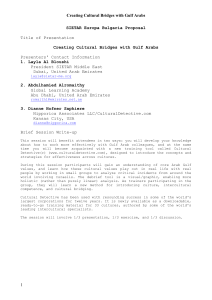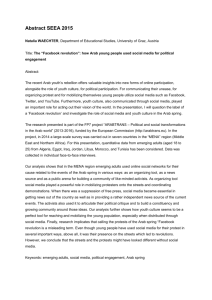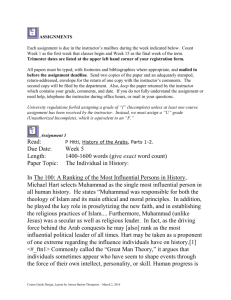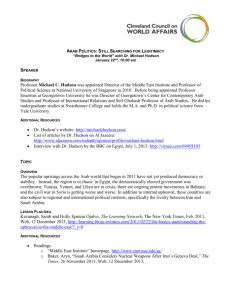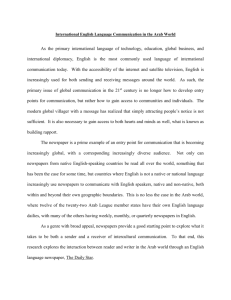The Essential Guide to Arabic Customs & Culture for the Business
advertisement
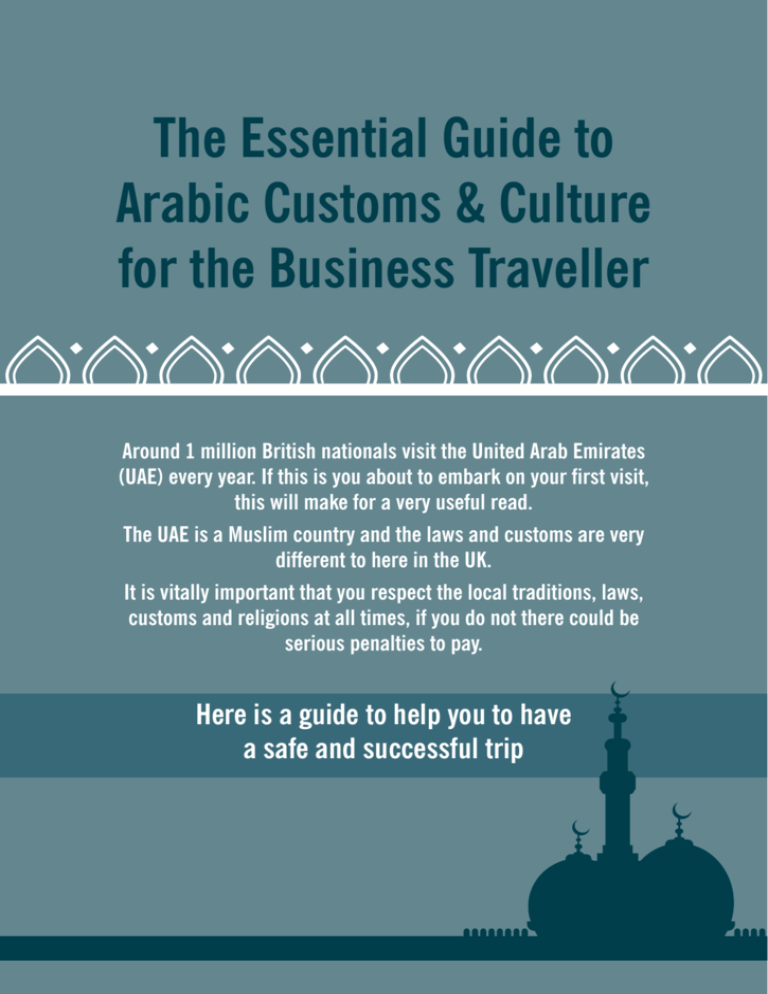
The Essential Guide to Arabic Customs & Culture for the Business Traveller Around 1 million British nationals visit the United Arab Emirates (UAE) every year. If this is you about to embark on your first visit, this will make for a very useful read. The UAE is a Muslim country and the laws and customs are very different to here in the UK. It is vitally important that you respect the local traditions, laws, customs and religions at all times, if you do not there could be serious penalties to pay. Here is a guide to help you to have a safe and successful trip The Geography of the Arab World The Arab World is an area which encompasses the region from the Atlantic Ocean near Northern Africa east to the Arabian Sea. Its northern boundary is the Mediterranean Sea while the southern boundary extends to the Horn of Africa and the Indian Ocean. USEFUL LINKS www.gov.uk/foreign-travel-advice/united-arab-emirates Here is a full list of Arab speaking Countries: 1) Algeria 2) Bahrain 3) Comoros 4) Djibouti 5) Egypt 6) Iraq 7) Jordan 8) Kuwait 9) Lebanon 10) Libya 11) Malta 12) Mauritania 13) Morocco 14)Oman 15)Qatar 16)Saudi Arabia 17)Somalia 18)Sudan 19)Syria 20)Tunisia 21)United Arab Emirates 22)Western Sahara 23)Yemen Local Laws and Customs Arab customs are very different to those in the UK so be aware of your actions so that you don’t offend, you really don’t want to cause any unnecessary problems. This is vital during the holy month of Ramadan or if intending to visit religious areas. 1. Shake hands every time you meet an Arab and every time you leave them, regardless of where you are. 2. When shaking hands remember not to use a firm grip. 3. Long handshakes are fine. 4. Touching the shoulder or forearms is acceptable practice. 5. Grasped elbows and even walking hand in hand is not uncommon. 8. Constructive criticism can be taken as an insult so be careful not to insult. 9. Saying to someone ‘I don’t know’ is considered distasteful to an Arab. 10. Women wear a headscarf as a sign of respect even if wearing western clothing. 11.If offered a refreshment you should accept it. 12.Always use your right hand for drinking and eating. Your left hand is considered unclean. 13.You should avoid showing the soles of your 6. Between Arabs there is more touching feet, this implies you think the person is ‘dirt’, highly offensive. So avoid crossing your legs between the same sexes to demonstrate their and keep your feet flat on the floor. friendship. If an Arab initiates a full embrace, participate and consider yourself accepted. 7. Contact between the opposite sexes in public is considered almost obscene. USEFUL LINKS www.30-days.net/islam/culture/customs The Customs of Ramadan Ramadan is a holy month for Muslims and the month it falls in varies from country to country so please check the date before visiting. It’s not impossible to do business during Ramadan but different rules do apply (so seek advice before you go). What different rules do apply? Our guide needs to help here. During Ramadan Muslims do not eat, drink, smoke or even chew gum during daylight hours. They use this time to pray, contemplate and take part in charity work. As a non-Muslim you should show respect so as not to offend. So avoid eating, drinking, smoking and chewing gum where you can be seen by Muslims, during daylight hours. Do not engage in any noisy behaviour, kiss or embrace anyone in public. Pregnant and nursing women as well as children are exempt. Take extra care with clothing during this holy month as standards are policed more than usual. Be aware that in some Muslim countries it is actually illegal to eat and drink in daylight hours during Ramadan. Some restaurants might close or operate under different hours during this time. Your awareness and observation of the rules stated above will be appreciated. Iftar is the time when the fast is broken and a meal is taken. Avoid travel at this time as there is extra pressure on taxis and public transport. Bear this in mind when planning getting to your meetings. Eid is the end of Ramadan and it gets busy! Plan ahead if intending to travel at this time too. USEFUL LINKS www.gov.uk/travelling-during-ramadan General Business Etiquette In business too many Arab customs are very different from those in the west, to do business successfully you need to be aware of how to behave. The below tips should be used in addition to those listed on page 7. Hand shaking In business it is customary to shake the hand of all the males first - do not grip too firmly. Use the right hand only, shake for longer but not firmly as we do in the west. The left hand grasps the elbow. Personal space The Arabs have a different concept to personal space, do not step away or lean in, this is considered offensive. Use of names On formal meetings it is important to use their full name. Before their full name you must say ‘Sayyed’ which is Sir for a man or ‘Sayeeda’ for a woman. Prior to doing business Before attempting to engage in business first, allow plenty of time for refreshments. It is important to establish respect and trust first. Managing time When in a meeting or a social visit with an Arab, do not look at your watch, it is rude to appear in a hurry. Time is less rigidly scheduled in Arab countries. Don’t talk business straight away, they will assume you are impatient. Body language Avoid pointing your finger or a pen while speaking, this is considered a threat and only animals are treated in this way. Business etiquette for Arab business women Stand as a woman enters the room. Do not shake hands with an Arab woman until she offers her hand first or if you are a woman. Do not talk in public to a professional Arab woman unless it is business related. Do not engage in conversation with an Arab woman unless you have been formally introduced. Do not maintain eye contact or stare at an Arab woman. USEFUL LINKS www.kwintessential.co.uk/resources/global-etiquette/saudi-arabia-country-profile.html www.arabianbusiness.com/industries/travel-hospitality General Greetings ‘Salam alaykum’- pronounced ‘Salam al-a-ee-kum’ This is the most common greeting and means ‘peace be upon you.’ The correct reply to this is ‘Wa alaykum as-salam’ pronounced ‘Wa al-a-ee-kum as-salam’ which means ‘and upon you’. When greeting and parting from Arab men, men should always shake hands. In the case of Arab women you should be guided by the woman. Many Arab women will not shake hands with non-Arab men, however, an educated woman might. After the handshake it is normal to enquire after the other person’s health and other matters, expect similar enquiries. Women should wait to see how the other person greets them, as a devout Muslim Arab men would never normally touch a woman who is not family. If this is the case the alternative is to place your hand over your heart. Eye contact during a discussion, often long and direct, is important. Staring is not considered rude unless gazing at women. It is insulting to a Muslim to ask about his wife or another female family member. USEFUL LINKS www.arab-business-etiquette.com General Arab Hospitality Many Middle Eastern people continue the custom of showing courtesy and consideration to strangers. If visiting their home there are a few customs that need to be acknowledged. Take a small gift as a token of thanks. Shoes in the house Before entering a house take off your shoes and leave outside. Sometimes slippers are provided. Clothes in the house Men do not wear shorts and women do not wear short sleeves or a sleeveless dress. Body language Do not stretch your legs out in front of others or sit higher than others. Avoid putting your left hand behind your back and don’t put your hands in your pockets. Show respect, don’t put your feet on furniture or lean on walls. Small talk Understand that there will be a lot of socialising and talk before the meal. There is little talk during the meal so you can enjoy the food. Food Some consider it rude to eat everything on your plate, so leave some as this is a compliment to the host. Arabs are restricted from eating Pork, unscaled fish and most carnivorous animals. Alcohol is forbidden. As a guest, accept food offered to you as a snack but only after refusing the first offer. Remember to use your right hand. Don’t raise your voice. USEFUL LINKS www.justlanded.com/english/Qatar/Qatar-Guide/Culture/Social-Customs Male and Female Dress Codes There are certain unwritten rules that you must observe so that you do not offend. Remember you are the foreigner and so it is down to you to adapt to the customs and behaviour of the area. In general Arabs frown on clothes which are too revealing, for example if showing your shoulders, arms or legs you are considered to be dressing provocatively. Foreign men aren’t expected to wear traditional dress, however, they must avoid wearing shorts and sleeveless tops in the street. This is regarded as too casual although opinion is softening. When in a private setting there are no restrictions on how to dress. In business In a business environment suits are worn to meetings and business related social events. Standard office wear is a long sleeved shirt and trousers. Elbows must be covered at all times. In a business setting it is appropriate for women to wear conservative suits. It must be dark in colour and a skirt must be below the knee. It is best for a woman to carry a scarf or a long handkerchief in her bag, which will allow you to cover your head if needed. USEFUL LINKS http://fas.org/irp/agency/army/arabculture.pdf


